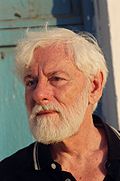ARIEL SHARON'S determination to kill Arafat was well known. Already during the siege of Beirut in Lebanon War I, it was no secret that agents were combing West Beirut for his whereabouts. To Sharon's great frustration, they did not find him.
Even after Oslo, when Arafat came back to Palestine, Sharon did not let up. When he became Prime Minister, my fear for Arafat's life became acute. When our army attacked Ramallah during "Operation Defensive Shield" they broke into Arafat's compound (Mukata'a is Arabic for compound) and came within 10 meters of his rooms. I saw them with my own eyes.
Twice during the siege of many months my friends and I went to stay at the Mukata'a for several days to serve as a human shield. When Sharon was asked why he did not kill Arafat, he answered that the presence of Israelis there made it impossible.
However, I believe that this was only a pretext. It was the US that forbade it. The Americans feared, quite rightly, that an open assassination would cause the whole Arab and Muslim world to explode in anti-American fury. I cannot prove it, but I am sure that Sharon was told by Washington: "On no condition are you allowed to kill him in a way that can be traced to you. If you can do it without leaving a trace, go ahead."
(Just as the US Secretary of State told Sharon in 1982 that on no condition was he allowed to attack Lebanon, unless there was a clear and internationally recognized provocation. Which was promptly provided.)
In an eerie coincidence, Sharon himself was felled by a stroke soon after Arafat's death, and has lived in a coma ever since.)
THE DAY Aljazeera's conclusions were published this week happened to be the 30th anniversary of my first meeting with Arafat, which for him was the first meeting with an Israeli.
It was at the height of the battle of Beirut. To get to him, I had to cross the lines of four belligerents -- the Israeli army, the Christian Lebanese Phalange militia, the Lebanese army and the PLO forces.I spoke with Arafat for two hours. There, in the middle of a war, when he could expect to find his death at any moment, we talked about Israeli-Palestinian peace, and even a federation of Israel and Palestine, perhaps to be joined by Jordan.
The meeting, which was announced by Arafat's office, caused a worldwide sensation. My account of the conversation was published in several leading newspapers.
On my way home, I heard on the radio that four cabinet ministers were demanding that I be put on trial for treason. The government of Menachem Begin instructed the Attorney General to open a criminal investigation. However, after several weeks, the AG determined that I had not broken any law. (The law was duly changed soon afterwards.)
IN THE many meetings I held with Arafat since then, I became totally convinced that he was an effective and trustworthy partner for peace.
I slowly began to understand how this father of the modern Palestinian liberation movement, considered an arch-terrorist by Israel and the US, became the leader of the Palestinian peace effort. Few people in history have been privileged to lead two successive revolutions in their lifetime.
When Arafat started his work, Palestine had disappeared from the map and from world consciousness. By using the "armed struggle" (alias "terrorism") he succeeded in putting Palestine back on the world's agenda.
His change of orientation occurred right after the 1973 war. That war, it will be remembered, started with stunning Arab successes and ended with a rout of the Egyptian and Syrian armies. Arafat, an engineer by profession, drew the logical conclusion: if the Arabs could not win an armed confrontation even in such ideal circumstances, other means had to be found
His decision to start peace negotiations with Israel went totally against the grain of the Palestinian National Movement, which considered Israel as a foreign invader. It took Arafat a full 15 years to convince his own people to accept his line, using all his wiles, tactical deftness and powers of persuasion. In the 1988 meeting of the Palestinian parliament-in-exile, the National Council, his concept was adopted: a Palestinian state side-by-side with Israel in part of the country. This state, with its capital in East Jerusalem and its borders based on the Green Line has been, since then, the fixed and unchangeable goal; the legacy of Arafat to his successors.
Not by accident, my contacts with Arafat, first indirectly through his assistants and then directly, started at the same time: 1974. I helped him to establish contact with the Israeli leadership, and especially with Yitzhak Rabin. This led to the 1993 Oslo agreement -- which was killed by the assassination of Rabin.
(Note: You can view every article as one long page if you sign up as an Advocate Member, or higher).






